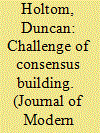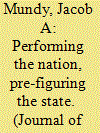|
|
|
Sort Order |
|
|
|
Items / Page
|
|
|
|
|
|
|
| Srl | Item |
| 1 |
ID:
077967


|
|
|
|
|
| Publication |
2007.
|
| Summary/Abstract |
As evidence of the failure of policy-based aid mounted in the early 1990s, a 'new aid agenda' developed. The agenda emphasised among other things, the importance of dialogue and partnership in order to help build ownership of more complex second-generation reforms. The Poverty Reduction Strategy Paper (PRSP) has developed as the key instrument for implementing this partnership in much of sub-Saharan Africa. However, this is not the only objective of the PRSP. Tanzania, at the forefront of attempts to restructure government-donor relations and one of the first countries to prepare a PRSP, illustrates the tensions created by the PRSP's complex genealogy and how these are being worked out in practice
|
|
|
|
|
|
|
|
|
|
|
|
|
|
|
|
| 2 |
ID:
077965


|
|
|
|
|
| Publication |
2007.
|
| Summary/Abstract |
This article examines the ways in which illicit gem mining in Madagascar indicates the highly variable impacts of globalisation in sub-Saharan Africa. It argues that distinct categories such as global/local, legal/illegal and traditional/modern have lost much of their explanatory power. Far from being distinct categories, they are indivisible and constitute a single, complex whole which produces enormous wealth, coupled with high degrees of poverty and marginalisation in precisely the same locations. It is clear that Africa's participation in globalisation has not been just about 'joining' the world economy; instead it has been characterised by highly selective forms of global connection which have been combined with highly visible and very real forms of disconnection.
|
|
|
|
|
|
|
|
|
|
|
|
|
|
|
|
| 3 |
ID:
077966


|
|
|
|
|
| Publication |
2007.
|
| Summary/Abstract |
The arrest and prosecution in March 2006 of the former Liberian warlord-President Charles Taylor by the UN-backed Special Court for Sierra Leone, for war crimes including the recruitment and use of child soldiers, and the arrest and prosecution of the Congolese warlord, Thomas Lubanga Dyilo, by the International Criminal Court, accused of enlisting child soldiers in the DRC war, have raised expectations that finally international conventions and customary international laws protecting children in conflict zones will now have enforcement powers. But why has it taken so long to protect children in conflict situations despite the volume of international treaties and conventions? What do we know about the phenomenon of child soldiering, and why are children still routinely recruited and used in Africa's bloody wars? This article argues that against the background of unfolding events relating to prosecution for enlistment of child soldiers, the international community is beginning to wake up to the challenge of enforcing its numerous 'paper protection' instruments for the protection of children. However, a range of challenges still pose serious threats to the implementation and enforcement of the international conventions protecting children. Extensive research fieldwork in Liberia and Sierra Leone over three years reveals that the application of the restrictive and Western-centric definition and construction of a 'child' and 'childhood' raises inherent difficulties in the African context. In addition, most war-torn and post-conflict African societies are faced with the challenge of incorporating international customary laws into their domestic laws. The failure of the international community to enforce its standards on child soldiers also has to do with the politics of ratification of international treaties, in particular the fear by African governments of setting dangerous precedents, since they are also culpable of recruitment and use of child soldiers
|
|
|
|
|
|
|
|
|
|
|
|
|
|
|
|
| 4 |
ID:
077969


|
|
|
|
|
| Publication |
2007.
|
| Summary/Abstract |
Recent social, economic and political changes in the Western Saharan refugee camps in southwest Algeria have import not only for the project of Western Saharan nationalism, but also for the ongoing peace process. These are examined through a background to the Western Sahara conflict, and an appraisal of the camps' internal processes of elite politics, self-management and recent post-war socio-economic change
|
|
|
|
|
|
|
|
|
|
|
|
|
|
|
|
| 5 |
ID:
077968


|
|
|
|
|
| Publication |
2007.
|
| Summary/Abstract |
Observation of the 2005 Ethiopian elections in two rural communities in south-east Amhara State reveals a picture very different from that presented in national-level analyses derived largely from urban areas. Deeply entrenched attitudes to power and government in the study area make the idea of peaceful electoral competition inconceivable. Peasants are first and foremost concerned to vote for the winning side, since to do otherwise carries intense risks to their welfare and even survival. The freedom with which the main opposition party was able to campaign until a few weeks before the election convinced many peasants that the government had abdicated, and that they should vote for the opposition as the likely winners. Belated mobilisation of the ruling party and state apparatus challenged this perception and created great uncertainty. This peasantry's political, economic and cultural alienation, allied to authoritarian rule and a lack of voter information placed genuinely 'free and fair' elections out of reach
|
|
|
|
|
|
|
|
|
|
|
|
|
|
|
|
| 6 |
ID:
077970


|
|
|
|
|
| Publication |
2007.
|
| Summary/Abstract |
The last two decades have witnessed a surge in studies of youth culture and social practice. In Africa, as elsewhere, this body of youth-centred research and writing has devoted considerable attention to specific groups within a given country's young population, while largely neglecting others seen to lack either culturally innovative or politically subversive traits. Youths in large cities and young combatants involved in insurgency or counter-insurgency have shared centre stage in studies of youthful Africa. This article argues for broadening the research agenda of African youth studies, calling for increased attention to the interpretive work performed by provincial youths as they try to understand and hopefully alter the future prospects of their communities in the new century. It shows how ideas about the meanings of globalisation and 'the millennium', intertwined with experiences of a recent refugee 'crisis', are shaping Guinean youths' socio-political reflections and yearnings. In doing so, it stresses just how complicated and cosmopolitan 'provincial' life, particularly for young people, has become in Guinea's forest region, as well as the variety and sophistication of the historical 'materials' and interpretive schemes through which these youths depict and judge possible local futures.
|
|
|
|
|
|
|
|
|
|
|
|
|
|
|
|
|
|
|
|
|